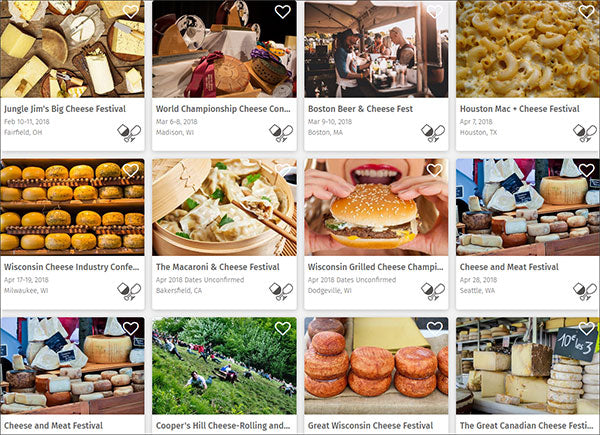If you have a passion for cheese and enjoy organizing events, then becoming a cheese event organizer could be a perfect fit for you. This profession requires individuals to possess exceptional organizational skills, creativity, and knowledge of the cheese industry.
Cheese event planning involves much more than just selecting a variety of cheese types. The role requires meticulous planning and the ability to create unique cheese-themed events that cater to the needs of attendees. As a cheese event organizer, you must be able to balance event coordination, vendor and supplier partnerships, budget management, and communication with stakeholders.
This article will explore the essential skills and knowledge requirements necessary to excel in this profession. It will provide insights into the importance of event planning and specific considerations involved in organizing cheese-themed events. Through this article, readers will gain insights on how to develop and grow in their career as a cheese event organizer, taking the first step to launch their journey in the cheese industry.
Cheese event organizers may be involved in different types of events, ranging from intimate cheese tastings to large-scale cheese festivals. As a cheese party planner, your job is to create unique, captivating events that showcase the best of the cheese industry.
Organizing a cheese festival can be a complex undertaking, involving a multitude of stakeholders, vendors, and attendees. As a cheese festival organizer, you must be able to manage logistics, ensure safety and compliance, and deliver an exceptional experience that keeps attendees coming back year after year.

One way to succeed in the cheese event industry is to understand the particular challenges and opportunities of each type of event. For example, while intimate cheese tastings require careful selection of cheeses and a delicate balance of flavors, cheese festivals demand an emphasis on logistics and crowd management.
| Type of Event | Key Responsibilities |
|---|---|
| Cheese Tasting Event | Selecting high-quality cheeses, creating a tasting menu, coordinating with vendors and suppliers |
| Cheese Festival | Managing logistics, securing sponsorships, coordinating vendors, ensuring compliance and safety |
| Artisan Cheese Event | Showcasing specialty and local cheeses, collaborating with artisan producers, creating a memorable experience for attendees |
By understanding the nuances of each type of event, you can tailor your approach to meet the needs of your clients and deliver exceptional results. As a cheese event organizer, you have the opportunity to showcase your creativity, passion, and expertise in the world of cheese.
Welcome to our fascinating quiz about Cheese Event Organization! Do you love cheese as much as you love organizing events? Then this quiz is perfect for you! Find out how much you really know about the tricks and trades of planning and executing a successful cheese event. Ready to dive in? Start now!
Planning a cheese tasting event requires meticulous attention to detail and selection of high-quality gourmet cheeses. As a cheese tasting event planner or gourmet cheese event organizer, it’s essential to create a tasting menu that showcases a range of textures, flavors, and aromas to provide guests with an unforgettable culinary experience.
When selecting cheeses, consider the event’s theme, budget, and audience preferences. Focus on quality over quantity, and choose cheeses from reliable and trustworthy suppliers. Be sure to include a mix of soft, hard, and aged cheeses from various milk types, such as cow, goat, and sheep.
| Tips for Planning Cheese Tasting Events |
|---|
| Coordinate with vendors and suppliers in advance to ensure sufficient quantities of cheese. |
| Create a variety of tasting stations with appropriate accompaniments, such as crackers, bread, and fruit. |
| Consider offering wine or beer pairings to enhance the cheese tasting experience. |
| Provide guests with tasting notes and a rating system to encourage engagement and feedback. |
By carefully planning and executing a cheese tasting event, you can provide guests with a unique and memorable experience that will leave them wanting more.

As a cheese event coordinator, you play a crucial role in executing memorable and successful cheese-themed events. You are responsible for coordinating logistics, managing resources, and ensuring that the event runs smoothly from start to finish.
Your first responsibility is to manage the event’s budget, including monitoring expenses, handling vendor contracts and payments, and ensuring profitability. You will also collaborate with vendors to plan production timelines, delivery schedules, and inventory management strategies.
Additionally, you will be responsible for overseeing the event’s setup, including equipment rental, lighting, sound, and seating arrangements. You will also manage staffing requirements, including scheduling and training event staff to ensure efficient execution of all tasks.
Another critical aspect of your role as a cheese event coordinator is stakeholder management. You will need to build relationships with clients, partners, and other stakeholders, ensuring open communication and collaboration to ensure all needs are met.
By effectively coordinating all aspects of cheese event management, you will be able to ensure a seamless experience for all involved, from attendees to vendors to stakeholders.

- Did you know? The cheese market is a thriving industry with an estimated global worth of over 69.7 billion U.S. dollars.
- For your information: The United States and France are among the top global producers of cheese.
- Something interesting: The scope for cheese events is wide, from cheese festivals to corporate cheese tasting events.
- A fun fact: Wine and cheese pairings can dramatically enhance the taste profile of both. This is why Cheese Event Organizers often collaborate with wine specialists.
- Ever wondered? There are over 1,800 varieties of cheese available worldwide. Cheese event professionals are expected to know a good deal about them.
- Worth noting: Artisanal cheese production has seen a major growth in recent years, which can provide ideal sources of unique cheeses for events.
- Don’t forget: Successful cheese events can significantly boost local economy by promoting local businesses and products.
If you have a passion for cheese and event planning, becoming a cheese event planner could be your ideal career. Here are some steps to help you get started:
- Gain experience in event planning – whether it’s through internships, volunteer work, or entry-level positions in event management, it’s essential to have experience in event planning to succeed as a cheese event planner.
- Get a formal education – consider pursuing a degree or certification in event planning or hospitality management to gain the necessary knowledge and skills for this profession.
- Develop a portfolio – showcase your experience and skills by developing a portfolio that highlights your previous events, planning processes, and successful outcomes.
- Build a network – attend industry conferences, join professional organizations, and connect with other cheese event planners to build a strong network of contacts in the cheese industry.
- Market yourself – create a website, social media presence, and business cards to promote yourself as a cheese event planner and attract potential clients.
Remember, the key to becoming a successful cheese event planner is to stay passionate, creative, and well-connected in the cheese industry.
Artisan cheese events are one of the most specialized and unique forms of cheese events. As an artisan cheese event organizer or gourmet cheese event planner, you must understand the nuances of the artisan cheese industry to deliver a memorable experience for your attendees.
The success of an artisan cheese event hinges on two key factors: showcasing local and unique cheeses and collaborating with artisan producers.
| Considerations for Artisan Cheese Events: | How to Address Them: |
|---|---|
| Location and Venue | Choose a venue that emphasizes the artisan atmosphere, such as a rustic farm or a boutique cheese shop. |
| Tasting Menu | Select unique and local artisan cheeses that complement each other and personalize the tasting menu to the audience. |
| Collaboration with Artisan Producers | Forge relationships with local artisan producers by inviting them to showcase their products and share their stories. |
| Experience and Atmosphere | Create an immersive experience for attendees by organizing cheese-making workshops, cheese pairings, and cheese trivia games. |
As an artisan cheese event organizer, you must focus on marketing and promoting your event to reach the right audience. Leverage social media platforms, collaborate with local cheese shops and restaurants, and showcase your event’s unique selling proposition to attract attendees.
Organizing a cheese festival is a monumental task that requires meticulous planning and coordination. As a cheese fest organizer, you must ensure that the event runs smoothly, offers an engaging program, and delivers a delightful experience for all attendees.
When organizing cheese festivals, securing sponsorships is an important aspect to consider. Sponsors provide financial support and contribute to the success of the event, which can help cover expenses, such as venue fees and entertainment costs. Moreover, having sponsors also helps to boost the event’s reputation and credibility.
In addition to sponsors, coordinating multiple vendors is also critical to the event’s success. This involves arranging for cheese suppliers, food trucks, and other vendors to attend the festival. You must ensure that each vendor has adequate space, equipment, and supplies to deliver their goods and services.

Ensuring crowd management and safety is paramount for cheese festivals. You must coordinate with security personnel and local authorities to develop an effective crowd management plan. This includes allocating appropriate signage, setting up barriers, and installing emergency services to ensure the safety of all attendees.
Overall, managing cheese festivals is a demanding but rewarding experience. With proper planning and coordination, you can create a unique and memorable event that showcases the best of the cheese industry.
Cheese event management involves a significant amount of financial planning and analysis to ensure that events are profitable and sustainable. Effective budgeting techniques must be utilized to balance costs and revenue and ensure that events meet attendee expectations.
One essential strategy for effective financial management is cost analysis. By analyzing the costs associated with every aspect of cheese event planning, including venue rental, catering, marketing, and staffing, event organizers can identify areas for cost savings and optimization.
Financial forecasting is another critical element of cheese event management. By forecasting revenue and expenses based on historical data and current trends, organizers can create realistic budgets and allocate resources effectively. It is essential to incorporate a contingency budget into financial planning to account for unexpected costs or issues that may arise during the event.
To maximize revenue, cheese event organizers can utilize several strategies, such as ticket sales and partnerships with relevant brands and vendors. It is crucial to perform due diligence while selecting partners to ensure that they align with the event’s values and target audience.
| Expense Category | Projected Cost | Actual Cost | Notes |
|---|---|---|---|
| Venue Rental | $5,000 | $5,500 | Rental price increased due to higher demand |
| Catering | $2,500 | $2,800 | Additional catering required due to higher attendance than projected |
| Marketing | $1,200 | $1,200 | No unexpected costs |
| Staffing | $1,000 | $1,000 | No unexpected costs |
| Total | $10,700 | $10,500 |
As shown in the sample budgeting table, unexpected costs and profit margins can significantly impact the success of cheese events. Event organizers must have a keen eye for financial planning to ensure profitability and avoid potential losses.
When it comes to promoting cheese events, creating an enticing event brand is key. This brand should showcase the unique elements of the event, such as the types of cheese being featured, guest speakers, or entertainment. By highlighting these features through strong visuals and messaging, you can attract attendees who are interested in these aspects of the event.
Another important component of promoting cheese events is identifying the right marketing channels. Consider the target audience for the event – what social media platforms do they use most frequently? Are there any industry publications or websites where advertising would be effective? Utilizing these channels will help ensure that your event is seen by the people most likely to attend.
Finally, social media platforms are a powerful tool for promoting cheese events. Creating event pages on Facebook, Twitter and Instagram can help generate interest and encourage attendees to share information about your event with their own followers. Additionally, paid social media advertising can allow you to target specific demographics with tailored messaging and visuals.
| Marketing Channel | Description |
|---|---|
| Social Media | Create event pages and utilize paid advertising to target specific demographics. |
| Industry Publications | Advertise events in publications specific to the cheese industry, such as Cheese Connoisseur Magazine or Cheese Reporter. |
| Email Marketing | Send personalized emails to potential attendees with information about the event and the benefits of attending. |
| Collaborations | Partner with complementary brands or local cheese shops to cross-promote the event. |
By utilizing a combination of these marketing channels and tactics, cheese event planners can increase visibility and attendance while creating a memorable experience for attendees.
As a cheese event organizer, it is important to prioritize continuous learning and professional development to stay competitive in the field. Industry trends and best practices are constantly evolving, and it is essential to keep up-to-date with the latest developments to stay relevant.
Networking is a critical aspect of professional development for cheese event organizers. Attending industry conferences, trade shows, and other events can provide opportunities to learn from peers, share knowledge, and build relationships with potential clients or partners.
There are also many resources available for professional development in the cheese event industry. Industry publications, webinars, and online courses can provide valuable insights and knowledge to enhance skills. Joining industry organizations can also provide access to exclusive resources and networking opportunities.
As a cheese event organizer, it is important to take a proactive approach to professional development. Setting goals for skill enhancement, attending relevant events, and regularly seeking out learning opportunities will contribute to continuous growth and career advancement.
To become a cheese event organizer, it is recommended to have a background in event planning or hospitality. You can start by gaining experience in event management and building a network within the cheese industry. It is essential to develop strong organizational and communication skills and stay updated with the latest trends in the cheese event industry.
A cheese event organizer can plan various types of events, including cheese tastings, cheese festivals, gourmet cheese parties, and artisan cheese events. The specific event will depend on the client’s requirements and the target audience. A cheese event organizer should be flexible and adaptable to cater to different event formats.
Planning a successful cheese tasting event involves careful selection of gourmet cheeses, creating a diverse tasting menu, and coordinating with suppliers and vendors to ensure fresh and high-quality cheeses. It is crucial to consider the event logistics, such as venue selection and layout, and engage attendees with educational and interactive elements.
A cheese event coordinator is responsible for coordinating various aspects of a cheese event, including logistics management, budgeting, vendor coordination, and ensuring the smooth execution of the event. They play a crucial role in communication with stakeholders, actively problem-solving, and ensuring a seamless experience for attendees.
To start a career as a cheese event planner, it is recommended to gain experience in event planning or hospitality management. Building a network within the cheese industry and earning relevant certifications can also be beneficial. Creating a portfolio of successful events and actively marketing your services is essential to attract clients and establish yourself as a cheese event planner.
Organizing artisan cheese events requires a focus on showcasing specialty and local cheeses, collaborating with artisan producers, and creating an authentic and immersive experience for attendees. Selecting suitable venues, designing event layouts that create opportunities for interaction and education, and effectively marketing the artisan cheese event are crucial for success.
Managing a cheese festival involves careful planning and coordination with multiple vendors, ensuring crowd management and safety, and securing sponsorships to cover the event costs. Effective budgeting, marketing, and stakeholder communication are key aspects of successful cheese festival management. Flexibility and adaptability are essential to tackle unforeseen challenges.
Financial management for cheese events involves budgeting, cost analysis, and careful financial forecasting. It is crucial to balance costs with attendee expectations and identify opportunities to maximize revenue through ticket sales, partnerships, and sponsorships. Regular financial monitoring and evaluation are necessary to ensure the financial success of cheese events.
Marketing and promoting cheese events can be done by creating an enticing event brand, utilizing targeted marketing channels such as social media, email marketing, and partnering with relevant influencers or organizations. Engaging content creation and implementing a comprehensive marketing strategy can attract attendees and generate buzz around cheese events.
Continuous learning and professional development as a cheese event organizer can be achieved through attending industry conferences, joining professional associations or networks, keeping updated with industry trends and best practices, and actively seeking educational resources such as books, courses, and workshops. Networking with industry professionals can also provide valuable insights and opportunities for growth.



